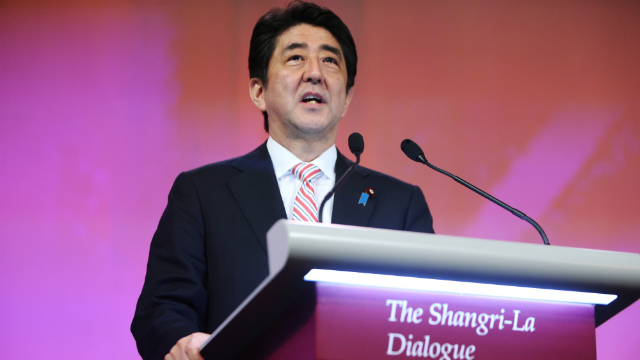Laying out a vision of Tokyo as a counterweight to the growing might of China, Abe offers Japan's help to regional partners 'to ensure security of the seas and skies'

SPEECH. Japanese Prime Minister Shinzo Abe gives the keynote address on the first day of The International Institute for Strategic Studies (IISS) 13th Asia Security Summit in
SINGAPORE – Japan's Prime Minister Shinzo Abe vowed Friday, May 30, that his country would play a larger role in promoting peace in Asia, and called for the rule of law to be upheld in the region.
Laying out a
vision of Tokyo as a counterweight to the growing
might of China , Abe offered Japan
He said Japan and the United
States stood ready to bolster security cooperation with Australia
"Japan intends to play an even greater and more
proactive role than it has until now in making peace in Asia and the world
something more certain," he said in a keynote speech at an annual Asia
security forum in Singapore
Abe said Japan will provide 10 new coast guard patrol
ships to the Philippines ,
which has one of Asia 's most poorly equipped
security forces.
He said 3 such
vessels have already been provided to Indonesia
and Vietnam
Abe delivered his
speech as tensions simmer over territorial disputes, involving China and some Southeast Asian states in the
South China Sea as well as between Tokyo and Beijing in the East China Sea .
Beijing claims
almost all of the South China Sea, even waters approaching the shores of neighboring
countries, and has become more aggressive in enforcing what it says are its
historical rights.
In the latest
tensions, Vietnam on
Thursday, May 29, accused Chinese war ships of pointing their weapons at
Vietnamese vessels during an escalating standoff near an oil rig in contested
waters in the South China Sea .
The Philippines has also faced increasingly tense
disputes with China
In one
high-profile incident in 2012, the Philippines
lost control of a rich fishing ground 220 kilometers (135 miles) off its main
island to China
On May 25, Japan accused China
"We do not
welcome dangerous encounters by fighter aircraft and vessels at sea," Abe
said, reiterating a call for both countries to establish a maritime and air
communication mechanism in order to prevent unexpected situations.
Abe repeatedly
used the phrase "rule of law" during his speech, urging nations to
respect international norms in dealing with territorial rows, avoiding coercion
in enforcing claims and settling disputes by peaceful means.
"I urge all
of us who live in Asia and the Pacific to each
individually uphold these 3 principles exhaustively," he said at the
Shangri-La Dialogue, a security forum involving defense chiefs, military
officials and security experts.
"Movement to
consolidate changes to the status quo by aggregating one fait accompli after
another can only be strongly condemned as something that contravenes the spirit
of these 3 principles," he said, without mentioning any country.
Abe told the
forum that talks were under way in his country about Japan
Its once-huge
armed forces were emasculated, stripped by the foreign-imposed constitution of
the right to wage war and restricted to a defensive role.
Speaking ahead of
Abe on the sidelines of the Singapore meeting, Fu Ying, the head of the foreign
affairs committee of China's parliament, said the Japanese leader did not
appear "to show any interest in addressing" their bilateral dispute.
Fu said Abe was
trying to use the dispute as an excuse to "amend the security policy of Japan ," adding that this is "what is
worrying to the region, and for China
http://www.rappler.com/world/regions/asia-pacific/59302-japan-plans-more-proactive-role-asian-security

No comments:
Post a Comment
Note: Only a member of this blog may post a comment.